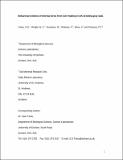Files in this item
Behavioral evidence of thermal stress from overheating in UK breeding gray seals
Item metadata
| dc.contributor.author | Twiss, S D | |
| dc.contributor.author | Wright, N C | |
| dc.contributor.author | Dunstone, N | |
| dc.contributor.author | Redman, P | |
| dc.contributor.author | Moss, S | |
| dc.contributor.author | Pomeroy, P P | |
| dc.date.accessioned | 2015-08-28T12:10:03Z | |
| dc.date.available | 2015-08-28T12:10:03Z | |
| dc.date.issued | 2002-04 | |
| dc.identifier | 778961 | |
| dc.identifier | 69d486c3-21ed-40dd-9ceb-261a962cf080 | |
| dc.identifier | 000175164000009 | |
| dc.identifier | 0036235428 | |
| dc.identifier.citation | Twiss , S D , Wright , N C , Dunstone , N , Redman , P , Moss , S & Pomeroy , P P 2002 , ' Behavioral evidence of thermal stress from overheating in UK breeding gray seals ' , Marine Mammal Science , vol. 18 , no. 2 , pp. 455-468 . https://doi.org/10.1111/j.1748-7692.2002.tb01048.x | en |
| dc.identifier.issn | 0824-0469 | |
| dc.identifier.other | ORCID: /0000-0003-1603-5630/work/46569100 | |
| dc.identifier.uri | https://hdl.handle.net/10023/7345 | |
| dc.description.abstract | Gray seals (Halichoerus grypus) in the UK exhibit clear preferences for pupping close to pools of water on inland breeding sites. The reasons for this are unclear as seals are thought to derive all their water requirements from the metabolism of fat. Likewise, the prospect of seals overheating during the UK's cool, damp, autumnal breeding seasons, has seemed unlikely, but has not been previously explored. Here, we provide preliminary behavioral evidence of thermal stress in female gray seals breeding on the island of North Rona, Scotland. Video footage provided measures of proximity to, and the proportion of animals bathing in, pools in relation to meteorological data (temperature, mean sea-level pressure, rainfall, wind speed and direction) on four dates spread through a single breeding season. The proportion of females close to pools increased with pressure (warmer, drier conditions) and decreased on wetter days. In addition, analyses of colony-wide patterns of seal dispersion showed that females tended to be closer to pools of water at higher pressures and temperatures and at lower wind-speeds. These results provide the first evidence of thermal stress and behavioral thermoregulation through access to pools of water in a phocid breeding in temperate autumnal conditions. | |
| dc.format.extent | 14 | |
| dc.format.extent | 307104 | |
| dc.language.iso | eng | |
| dc.relation.ispartof | Marine Mammal Science | en |
| dc.subject | Gray seal | en |
| dc.subject | Halichoerus grypus | en |
| dc.subject | Behavioral thermoregulation | en |
| dc.subject | Breeding habitat | en |
| dc.subject | North Rona | en |
| dc.subject | QH301 Biology | en |
| dc.subject.lcc | QH301 | en |
| dc.title | Behavioral evidence of thermal stress from overheating in UK breeding gray seals | en |
| dc.type | Journal article | en |
| dc.contributor.institution | University of St Andrews. School of Biology | en |
| dc.contributor.institution | University of St Andrews. Scottish Oceans Institute | en |
| dc.identifier.doi | https://doi.org/10.1111/j.1748-7692.2002.tb01048.x | |
| dc.description.status | Peer reviewed | en |
| dc.identifier.url | http://www.scopus.com/inward/record.url?scp=0036235428&partnerID=8YFLogxK | en |
This item appears in the following Collection(s)
Items in the St Andrews Research Repository are protected by copyright, with all rights reserved, unless otherwise indicated.

